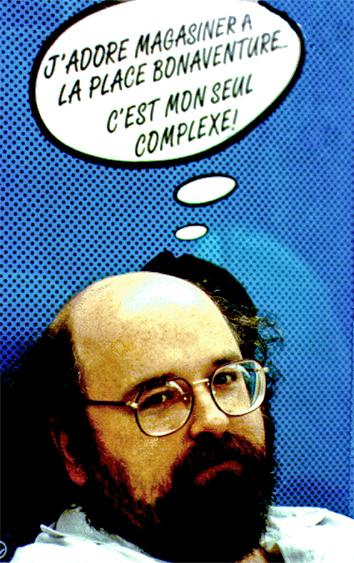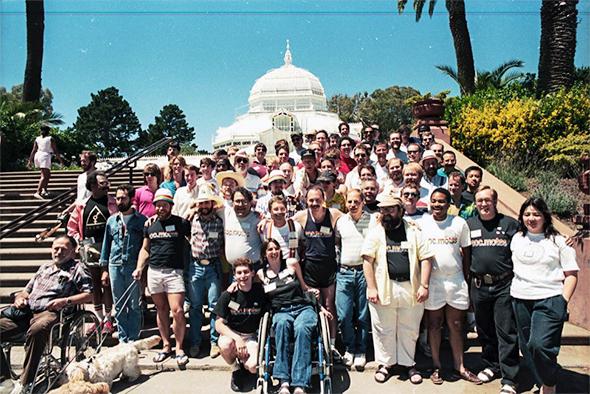I grew up in a time and place—the Los Angeles suburbs of the 1980s—where LGBTQ culture was pretty much invisible in everyday life. The first out people I met were online. In fact, LGBTQ culture played a significant, though underreported, part in shaping the overall online culture. Since the early 1980s, there have been many LGBTQ spaces on the Net: newsgroups, bulletin board systems, or BBSs, mailing lists, social networks, chat rooms, and websites. But the very first LGBTQ Internet space, as far as I’ve been able to find, was the soc.motss newsgroup. And it hosted conversations that had never been seen before online—and that arguably remain in too short supply even today. (I’ll be frequently using “LGBTQ” as the best available catchall term, with the awareness that categories and nomenclature have gone through many evolutions since the early 1980s.)
In 1983 programmer Steve Dyer started a discussion forum called net.motss (later soc.motss) on the Usenet newsgroup system. Built in 1980 atop pre-Internet networks such as ARPANET and BITNET, Usenet allowed for creation of hierarchical categories of interest groups (comp.lang.java.help, rec.arts.books, etc.) and public threaded discussions within each group, in much the same way forums and comments work today. The abbreviation “motss” stood for “members of the same sex,” an unflashy acronym that would make it less of a potential target for censorship. University of Colorado–Boulder professor Amy Goodloe, who went on to start many lesbian Usenet groups as well as found and run lesbian.org in 1995, calls soc.motss the first explicitly LGBTQ newsgroup—and possibly the first explicitly LGBTQ international space of any kind.
And it was a prominent space: By the early 1990s, motss member and software engineer Brian Reid estimated that about 3 percent of all Usenet readers were reading soc.motss, which was an audience of about 83,000 people. (For comparison, 8 percent were reading the perennially popular alt.sex.)
Dyer, who died in 2010, was a Unix hacker who worked at BBN before becoming a private consultant. In the very first motss post on Oct. 7, 1983, Dyer set out the newsgroup’s aims: “to foster discussion on a wide variety of topics, such as health problems, parenting, relationships, clearances, job security and many others.” Dyer stressed that the forum would provide “a supportive environment” for gay USENET members: “Net.motss is emphatically NOT a newsgroup for the discussion of whether homosexuality is good or bad, natural or unnatural. Nor is it a place where conduct unsuitable for the net will be allowed or condoned.”

Ken Rudolph, kenru.net/motss
According to engineer Nelson Minar, who was active on soc.motss in the early 1990s, newsgroups of the 1980s and ’90s tended to have a slower pace of discussion. A day could pass before someone replied to a thread, and responses were frequently closer to mini-essays than short comments. That sort of belles-lettristic group dialogue allowed for a deeply nuanced and intellectual discussion of gay and lesbian issues.
Because of its international reach, soc.motss was less suitable for negotiating hookups than regional BBSs were. (One of soc.motss’ first posts was a man asking how to meet other gays without drugs or alcohol being involved.) The posters ranged in age from late teens to middle age, and a self-reported census in 1993 showed a quarter of them to be women.
Inevitably, much discussion centered on coming out, how to come out, and how to cope with the consequences. Political issues—from the Supreme Court’s 1986 sodomy decision in Bowers v. Hardwick to Orson Scott Card’s anti-gay writings to the legacy of Harvey Milk—evoked passionate debate. This was an a era when George Bush was calling for mandatory nationwide AIDS testing and when, according to Surgeon General C. Everett Koop, Ronald Reagan’s advisers felt that gays and drug users who contracted AIDS were “only getting what they justly deserve.” Online discussion became a necessary counter to AIDS hysteria and ignorance, where people could share their own stories and alternative news sources.
The motss community prized free expression. (Dyer summed up the predominant attitude when he recommended the transgressive trans writer Pat Califia: “[S]he states her positions unbowed by the neo-puritanical ravings of some members of the gay orthodoxy.”) Everything on Usenet was public and, early on, non-anonymous, since Usenet accounts were usually linked to a real identity associated with a university or corporation. So even posting to the group at all took a certain boldness and iconoclasm, personality traits that Minar correlates with the “dual minority” of being both queer and a computer nerd. Yet because all posts were public (and because newsreaders in the 1980s didn’t thread discussions, forcing you to browse through every post), many more people read than posted, so much of the impact of soc.motss was on a silent audience that never identified itself.
There were in-jokes, wryness, and sarcasm, as with motss member Steven Levine’s description of growing too old and bitter to go to bars:
Each day I grow older, and this brings age and experience to the gay community. … Where once I was whory, I now am hoary. I, the gay community, pass from new to used to collectible to vintage to antique. … Each day I grow fatter. This increases the size of the gay community, and makes us more of a force to be reckoned with. Within the soft folds of my expanding flesh I contain the history of all gay men.
Network engineer and motss contributor Max Meredith Vasilatos slammed attacks on homosexuality as “unnatural” by describing the human body as “a hack, a gigantic complex construction with outdated features (e.g., appendixes) left over, and new bugs perpetually cropping up as the synergy of the system changes.” Somewhat more highbrow was member Michelle Elliott’s pastiche of Greek comedy writer Aristophanes, “The Clods.” And fulfilling the obligatory quotient of Internet nerdiness, Gene Ward Smith applied Ramsey combinatorics to gay love: “In any group of six gay men, there must exist three all of whom would like to sleep with each other, or a group of three none of whom would like to sleep with each other (or both).” Smith suggested a party game with six people, and that the group of three be declared either a “love triangle” if they want to sleep with each other or a “moral minority” if not.
Some of that nerdiness spread beyond motss. The geeky urge to classify resulted in the Bear Code (officially, the Natural Bears Classification System), invented by Bob Donahue and Jeff Stoner in 1989 as an “incredibly-scientific system to describe bears and bear-like men.” Santa Claus’ classification, for instance, was “B8 d++ f? w++ k–?,” describing him as a big round (w++) daddy bear (d++) with a very bushy beard (B8) whom people guess to be averagely furry (f?) and not kinky at all (k–?). This format inspired the later Geek Code, which was ubiquitous in Unix profiles and email sigs in the 1990s—except instead of codes for weight and beard, the Geek Code offered opinions of Linux (l+++++ if you were Linux author Linus Torvalds) and Star Trek (t— if you hated Star Trek). The origins of the Geek Code in the Bear Code were quickly forgotten.
Some of the motss conversation brought acute and varied social criticism into the mix, as with Dana Bergen’s nuanced 1991 plea for understanding of—not agreement with—anti-porn and anti-BDSM feminists: “I think it’s almost impossible for men to understand, on a gut level, the extent to which sexual violence and the fear of it affects women’s lives. … I would like men to have a bit more respect for these feelings.” In 1992 Jeff Shaumeyer wrote about being “barraged by heterocentrism,” about the pain of being stigmatized and shoved aside: “Why is it that one man calling another a faggot is the worst insult he can make? I shouldn’t take this personally?”
And some of it is just incredibly raw and heart-wrenching, like linguist Arnold Zwicky’s advice to a young man on breakups: “you’re poking your tongue in the sore in your mouth and savoring the pain. think very carefully about why you’re hanging on to the idea that x, who you can’t have, is the only thing that can fulfill you. you know that’s not so, but you twist your body around on the sword anyway. why? do you think you’re such a shit that this is what you deserve?” Zwicky was 45 when he discovered soc.motss, and he said that it changed his life: “i found a gay community and also found friends, and their friends, and so on, so that my social world has been transformed.” Many members met up once a year for an event called motss.con, which still goes on today.
Because Net access was limited in the 1980s, Steve Dyer also provided accounts on his own machine, spdcc, to those who wouldn’t otherwise have access. Dyer moderated the group in attempts to prevent it from becoming, in his words, “a space for the ignoramuses’ perennial harangue about the evils of homosexuality, or for that matter, responses to the contrary.” His geeky bonhomie is on display in his Chaucer pastiche “The Dyer’s Tale,” where he tells of the anti-gay trolls that had set upon soc.motss:
[W]e want some succor now that hell is done.
Perhaps a poem of epic length in rhyme
will undo prose of hurt and spite. It’s time
we took our newsgroup back; seize what we’ve won.
…
Now every word of bigotry and hate
shall be drowned out as rhymes accumulate.
Many of the members of soc.motss were not typical of the larger LGBTQ culture of the time. One of them, writing in 1992 about his own coming-out experience, wrote, “I am generally not a gregarious person, and [coming out] was the culmination of introspection with the emotional support of a few close friends. … I panic at the thought of meeting strangers, and am met with disbelief. I claim to feel bereft of social skills, and they scoff. Will any of these people ever see what I think is the *real* me? With whom do I share enough trust to reveal part of the *real* me?”
Before the Internet became part of everyone’s life, it often served as a social refuge for people who felt too shy, too unaccepted, too intellectual, or simply too different for everyday culture. Ironically, they would be the pioneers of spaces that allowed for freer, more open self-expression. Minar feels that soc.motss was something rare, both then and now: “an intelligent place for discussion of gay issues with some sort of filter for thoughtfulness of the members. We were there to discuss opera and culture and Madonna, not to get laid.”
Many newsgroups were purely informational, useful for technical discussions or sharing of news or jokes or porn. But soc.motss was genuinely a new kind of community, a diverse set of people who felt at home and most like themselves on the Net, and who had discussions there that they couldn’t have anywhere else. Before Facebook preferred status updates to long posts and Twitter reduced the size of a rebuttal to 140 characters, soc.motss proved that online discourse was indeed compatible with open-mindedness, subtlety, and civility.
